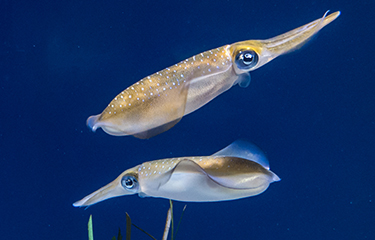Okinawa research team breeds 10 generations of captive squid

Researchers from the Physics and Biology Unit at the Okinawa Institute of Science and Technology (OIST) Graduate University have developed a squid aquaculture system with potential for commercialization.
The OIST team has succeeded in rearing 10 generations of a species of oval squid, Sepioteuthis lessoniana (also known as bigfin reef squid), while other researches achieved a maximum of seven.
“This is a groundbreaking step towards the development of sustainable squid farming over multiple generations,” said OIST Professor Jonathan Miller, who leads the research unit.
For the past 60 years, scientists attempted to establish squid aquaculture with only minor successes. The new system has closed the lifecycle of the squid in a way that is efficient and cheap enough to be commercialized, though further cost reductions will be needed to compete with wild-caught squid, Miller said.
Okinawa has three species of oval squid, with two species inhabiting waters around Japan’s main islands. Miller said the OIST aquaculture system focuses on providing good conditions for spawning and hatching.
Details of the OIST system were presented at the 2018 Cephalopod International Advisory Council Conference. The OIST presentation, titled “Captive breeding of the oval squid (Aori-ika; Sepioteuthis sp.)” reviews the flow tanks used, the use of tree branches as a substrate for egg deposition, the team's control of light, and its experimentation with different tank environments and feeding regimens.
“We applied knowledge from different parts of aquaculture and made a lot of adjustments,” OIST Visiting Researcher Ryuta Nakajima said. “Compared to my experience in two other labs, the hatching and survival rate of the animals is much higher here.”
The OIST team has applied for a provisional patent, and the researchers are working with OIST’s Office of Technology Development and Innovation (TDIC) to meet with companies that would be interested in commercializing the invention.
“We are excited to promote this technology externally to companies for potential licensing opportunities,” TDIC’s Technology Licensing Specialist Graham Garner said.
Photo courtesy of David A Litman/Shutterstock






Share